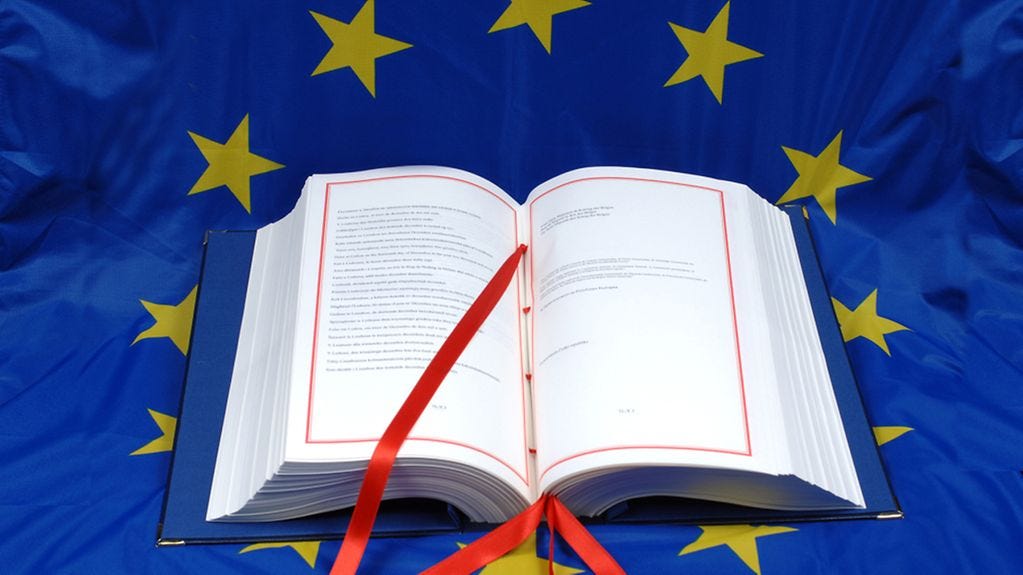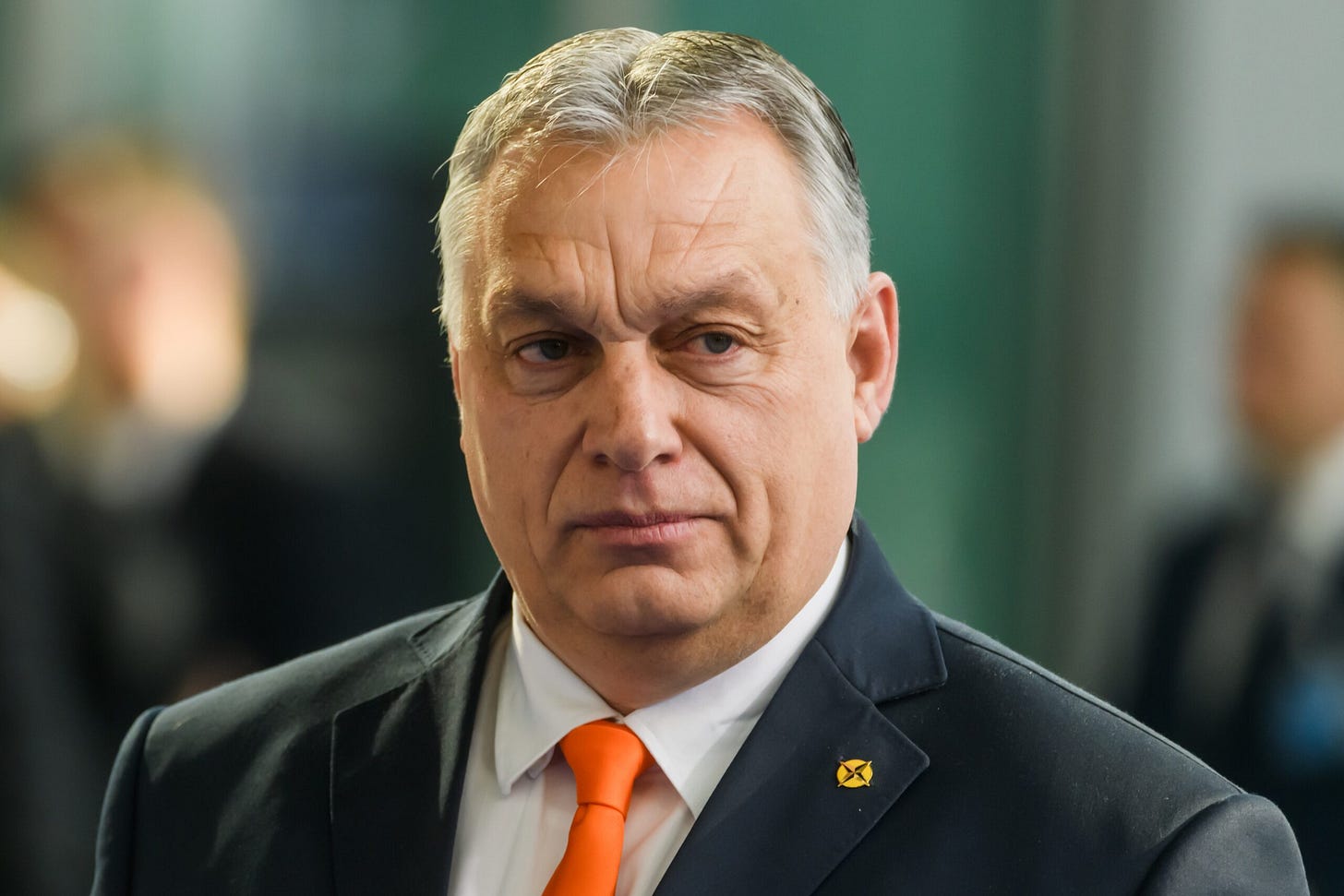A Convention for a European Constitution - What for?
On Wednesday's SOTEU address, Ursula von der Leyen voiced her support to the convening of a Convention to draft new European Treaties. What should renewed founding European texts include?
It was one of the most interesting announces of Wednesday’s State of the European Union address of the European Commission’s President Ursula von der Leyen. The boss of the European executive voiced clear support for a Convention to draft new European Treaties.
This stance comes after the European Parliament adopted a resolution calling for a Convention on 9 June, and before the October European Council, where European leaders are expected to discuss the idea.
So, here we are, hoping that Europe could see a new (and first) Constitution by the end of next year (I know, I am an optimist). Let’s imagine the Convention takes place - for which you, discerning readers, understand that it is easier said than done -, what will it include? What are the number one issues that Europe needs to tackle in the revision of its “user manual”?
Let’s consider three ideas that could very well feature on the agenda of the Convention that the President of the Commission endorsed.
The end of the veto at the Council
If there is one thing that plagues EU lawmaking, it is this one. In order to preserve the interest of the Member States, the current treaties foresee that in the case of “matters which the member states consider to be sensitive”, the Council can cast a majority vote. These matters include:
common foreign and security policy
citizenship
EU membership
EU finances and taxation
certain provisions in the field of justice and home affairs
Social security and social protection.
Once quickly understand, reading this list, that all the items necessary for Europe to become a global player or improve its capabilities fall under unanimity voting. In a union of 27 - soon to enlarge to 30 countries and more - all it takes is one angry head of government to stop all progress for the whole of Europe.
That is why the Council is not too keen to allow for a revision of the treaties. The angry leaders know that they have much to lose if a Convention is called to draft new treaties, new rules, and new voting systems.
New treaties would probably propose to use a qualified majority voting (a majority of countries representing a majority of citizens) in most, if not all, the areas cited above.
More power to the Union and the European Parliament
You will not learn anything new if I tell you that the European Union and the national Member States share competencies. Some are indeed shared (agricultural, environmental, energetic, etc. policies), others are of the sole responsibilities of the EU (customs, monetary policy for the Eurozone, trade, etc.), and others are exclusive to the Member States (the most “sensitive” ones: Defense, taxation, most social policies, etc.)
A new treaty would most probably reshuffle this division in favor of the European Union. Although the principle of subsidiarity (a competency is given to the EU only if it can benefit from the European-wide level) can give arguments to both sides of the debate, we must acknowledge the efficiency of coordinated and harmonised decisions.
Thus, on climate and energetic matters, social and economic policies, defense, etc., one can expect the EU to increase its grasp on a wide range of policies, even those reserved to Member States so far.
This will go hand in hand with the empowerment of European institutions. More responsibilities will mean more power to the European Commission, the executive branch of the EU. But the institution that has most to win from a treaty revision is the European Parliament. So far, its powers are merely of a “registration chamber”, agreeing to texts that have already been drafted at the Commission, and which have no chance to pass is the Council is opposed anyways.
New rules for the Parliament will most certainly make it able to initiate legal proposals, vote on the budget of the Union, and will see its relevance increased to match the one of the Council of ministers, which could be transformed into an upper house of Europe’s legislative branch.
Stronger social policies
The reason for her support for treaty change, President Ursula von der Leyen said in her SOTEU speech, is to “enshrine solidarity between generations” in the treaties. She wants to recommit Europe to a social market economy. Let’s explore measures that could be introduced as Europe sets solidarity as its founding principle.
A Europe-wide minimum wage framework
Instead of a clear minimum wage - chich would be unsustainable for some poorer countries and irrelevant for richer economies - Europe could introduce a calculation methodology for a guaranteed minimum wage for all European workers.
This minimum wage could be calculated on the economic performance of the country, local or sectorial agreements between businesses and trade unions, the cost of basic items, etc.
Of course, it should also be allowed for Member States to set national minimum wages that are above the European minimal threshold. In addition, payslips could mention that “Europe guarantees a minimum wage for all European workers.”
A Europe-wide pension system
Another social measure that the new treaties could offer is a European-wide pension system. More and more, pensioners travel to foreign countries to enjoy a well-deserved rest in warmer and perhaps cheaper countries.
But while citizens of Europe cross borders easily, the pension system of their country of origin has not. If a French citizen who worked in the UK wants to retire in Spain, he must wait for reaching the pension age in the UK to receive his full pension in the French system.
A Europe-wide pension system, which would trigger once a worker takes on a job under a different system than his previous employer, would allow for easiness and fairer situations for cross-border workers and expats, which a so valuable to spread the European mindset.
What are you expecting from a treaty revision? Do you think that the European Council will agree to a Convention? Let’s debate it in the comment section.
And as always, if you are new to this newsletter, do subscribe to The Beubble, your daily information source on EU politics and policies. And introduce yourself in the comments.






